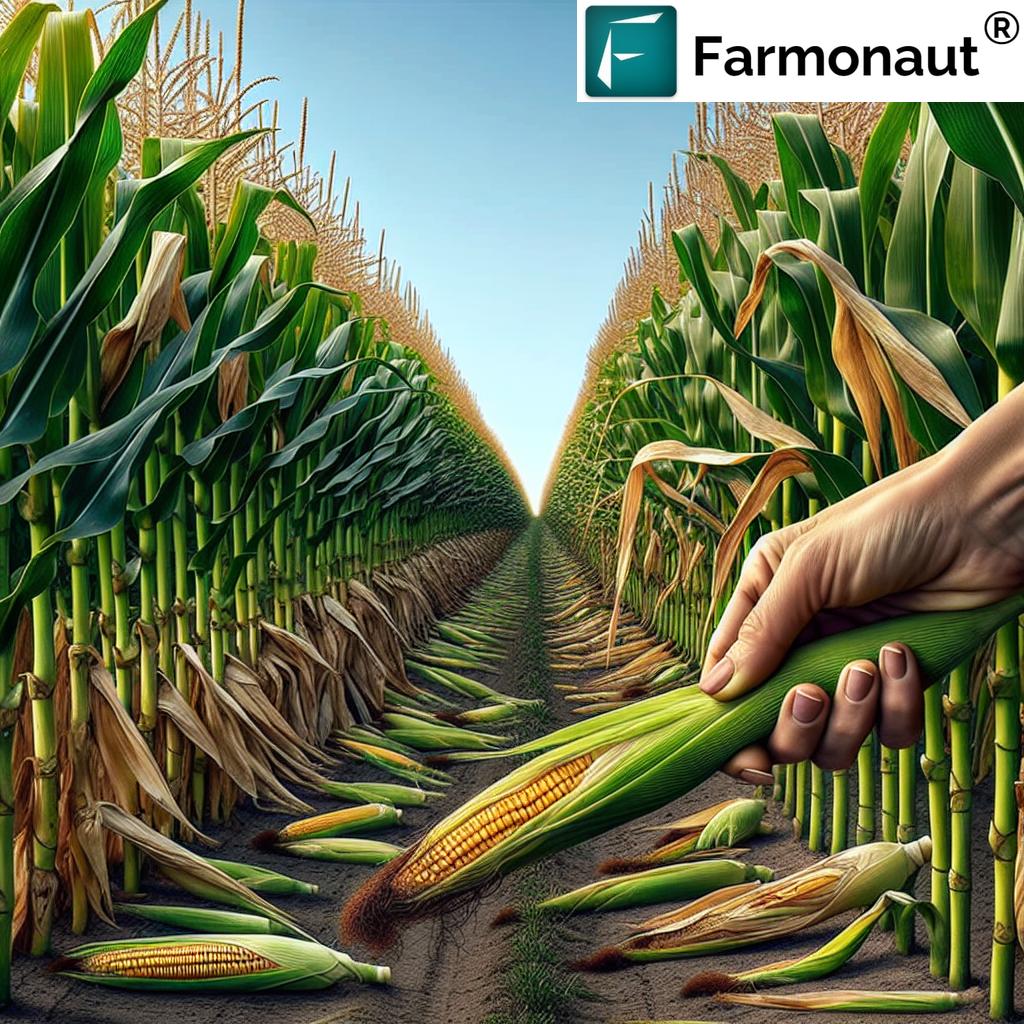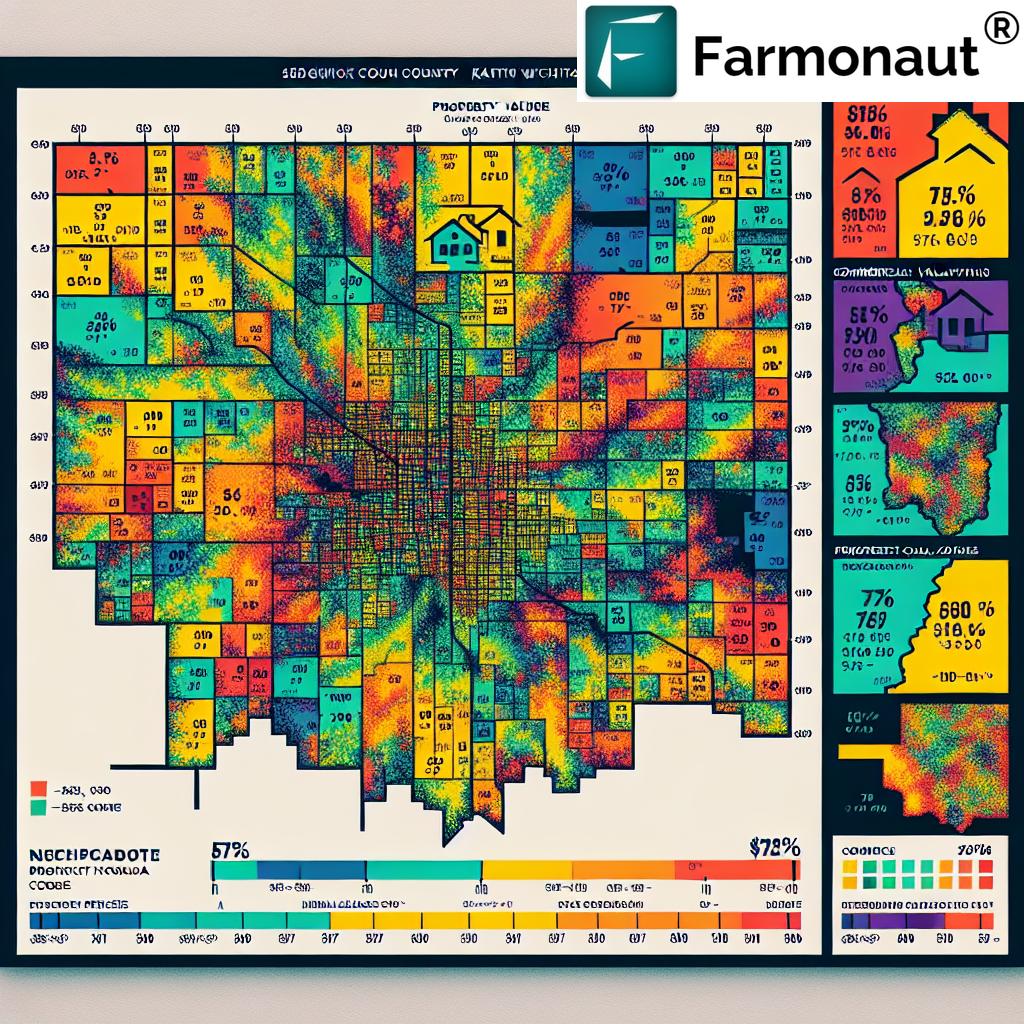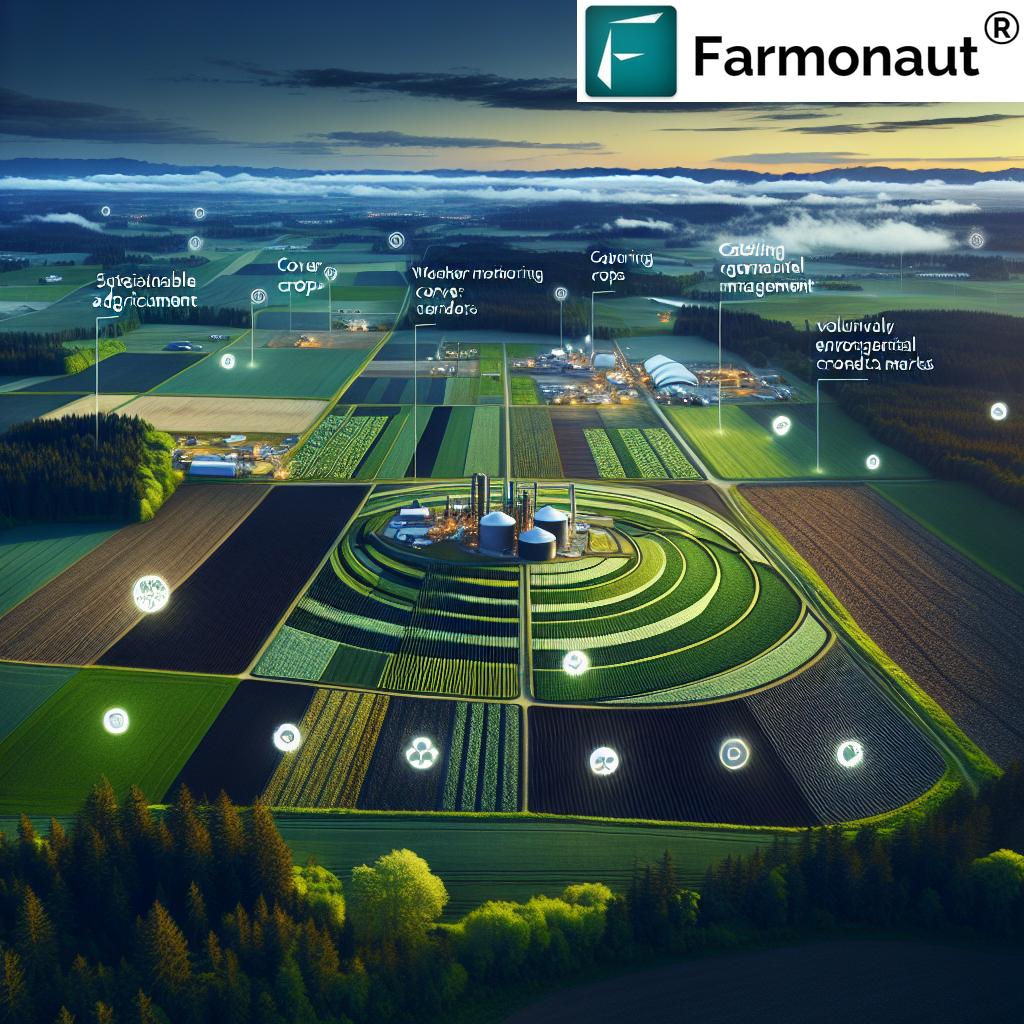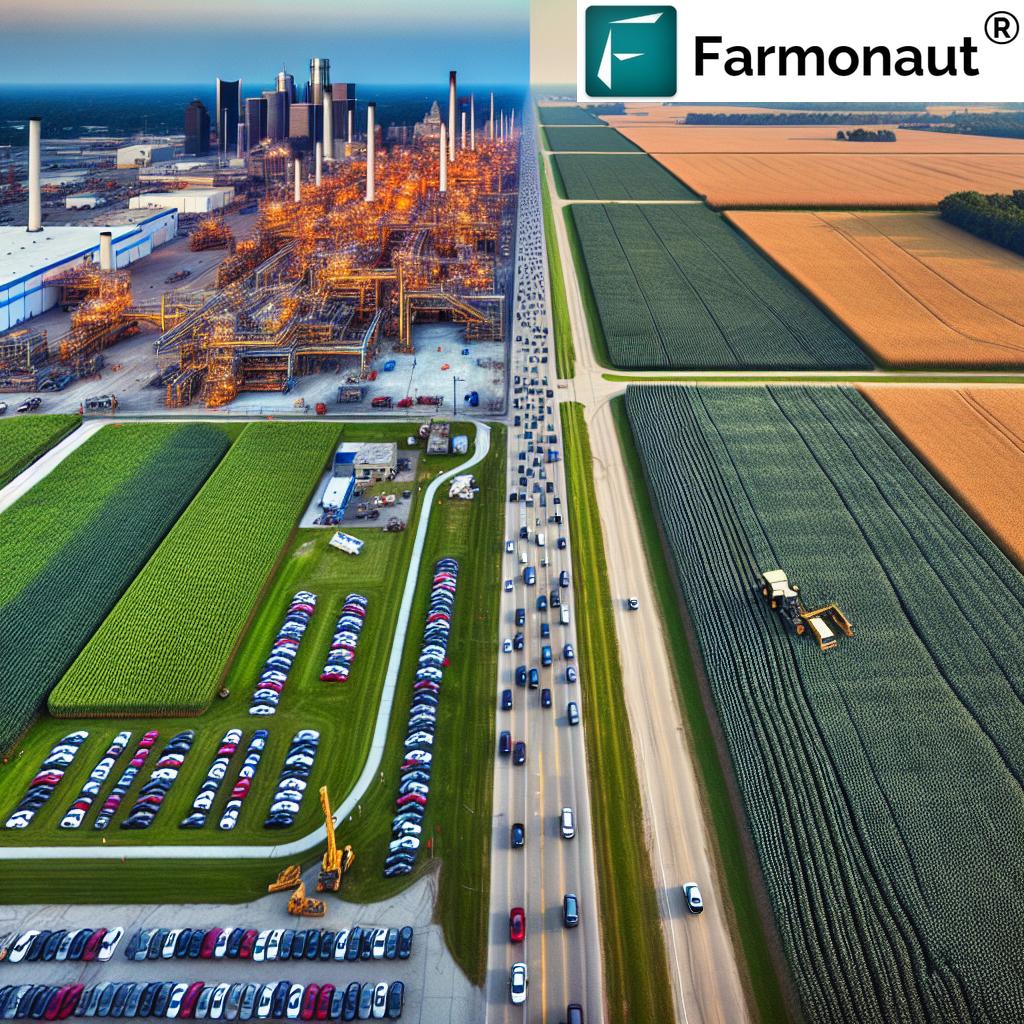Innovative Nebraska Partnership: How Biodiesel Fuels Sustainable Agriculture and Clean Transportation
“Biodiesel blends in athletic transportation can reduce greenhouse gas emissions by up to 86% compared to petroleum diesel.”
In the heartland of America, a groundbreaking initiative is taking root, one that promises to revolutionize both agriculture and transportation. We’re excited to delve into the innovative partnership emerging in Nebraska, where biodiesel is fueling a sustainable future for farmers and environmentally conscious consumers alike. This collaboration between the agricultural sector and clean energy advocates is not just changing the landscape of rural America; it’s setting a new standard for eco-friendly practices across the nation.
The Rise of Biodiesel in Nebraska Agriculture
Nebraska, known for its vast soybean fields and commitment to agricultural innovation, has become a hotbed for biodiesel production. This renewable fuel, derived primarily from soybean oil, is transforming the way we think about energy in both agriculture and transportation. Let’s explore how this shift is benefiting farmers, reducing emissions, and creating a more sustainable future for all.
- Soybean farmers see increased demand for their crops
- Biodiesel production creates new revenue streams for rural communities
- Reduced reliance on fossil fuels improves energy independence
As we dive deeper into this topic, it’s important to note that tools like those offered by Farmonaut can play a crucial role in optimizing soybean production for biodiesel. While Farmonaut isn’t directly involved in biodiesel manufacturing, its satellite-based crop monitoring technology can help farmers maximize their yields, contributing to the overall success of biodiesel initiatives.

Biodiesel: A Clean Fuel Alternative
Biodiesel stands out as a beacon of hope in the quest for cleaner, more sustainable fuel options. This renewable energy source offers numerous advantages over traditional petroleum-based diesel, particularly in terms of environmental impact and support for local economies.
Key benefits of biodiesel include:
- Lower greenhouse gas emissions
- Reduced dependence on fossil fuels
- Improved air quality in urban areas
- Support for local agriculture and rural economies
The integration of biodiesel into various sectors, especially transportation, marks a significant step towards a greener future. In Nebraska, we’re seeing this clean fuel alternative make waves in an unexpected arena: sports transportation.
Sustainable Transportation in Sports: A Game-Changing Move
The world of sports is embracing sustainability like never before, and Nebraska is leading the charge with its innovative use of biodiesel in athletic transportation. This forward-thinking approach not only reduces the carbon footprint of sports events but also showcases the practical applications of renewable energy in everyday life.
Imagine college football teams traveling to games in buses powered by biodiesel made from locally grown soybeans. It’s not just a dream; it’s becoming a reality in Nebraska. This initiative is a prime example of how biodiesel can be successfully integrated into high-profile sectors, demonstrating its reliability and environmental benefits on a grand stage.
Soybean Farming Benefits: From Field to Fuel
The rise of biodiesel has brought newfound prosperity to Nebraska’s soybean farmers. This crop, once primarily used for food and animal feed, has found a lucrative new market in the energy sector. Let’s break down the benefits:
- Increased demand for soybeans drives up prices, benefiting farmers
- Diversification of soybean uses provides economic stability
- Local processing of biodiesel keeps money within the community
- Farmers become key players in the renewable energy landscape
For farmers looking to optimize their soybean production for biodiesel, precision agriculture tools can be invaluable. Platforms like Farmonaut offer satellite-based crop health monitoring and AI-driven insights that can help farmers make data-informed decisions to maximize their yields.
Reducing Greenhouse Gas Emissions in Agriculture
One of the most significant advantages of biodiesel is its potential to drastically reduce greenhouse gas emissions in agriculture. When compared to traditional diesel, biodiesel offers a cleaner burn and a smaller carbon footprint. Here’s how it’s making a difference:
- Lower carbon dioxide emissions during combustion
- Reduced particulate matter, improving air quality
- Biodegradable nature minimizes environmental impact in case of spills
- Lifecycle analysis shows significant reduction in overall emissions
By adopting biodiesel, Nebraska’s agricultural sector is taking a proactive stance in the fight against climate change. This shift not only benefits the environment but also positions the state as a leader in sustainable farming practices.
“Nebraska’s soybean farmers contribute to over 50% of the state’s biodiesel production, supporting local agriculture and sustainability efforts.”
Locally Sourced Feedstocks: The Heart of Biodiesel Production
The success of Nebraska’s biodiesel initiative lies in its use of locally sourced feedstocks. Soybean oil, the primary ingredient in most biodiesel blends, is abundant in the state. This local sourcing brings several advantages:
- Reduced transportation costs and emissions for feedstock delivery
- Support for local farmers and agricultural communities
- Enhanced traceability and quality control of biodiesel ingredients
- Promotion of a circular economy within the state
The use of locally grown products in biodiesel production exemplifies the potential for agriculture to contribute to sustainable energy solutions. It’s a model that could be replicated in other regions, tailored to local crop varieties and agricultural strengths.
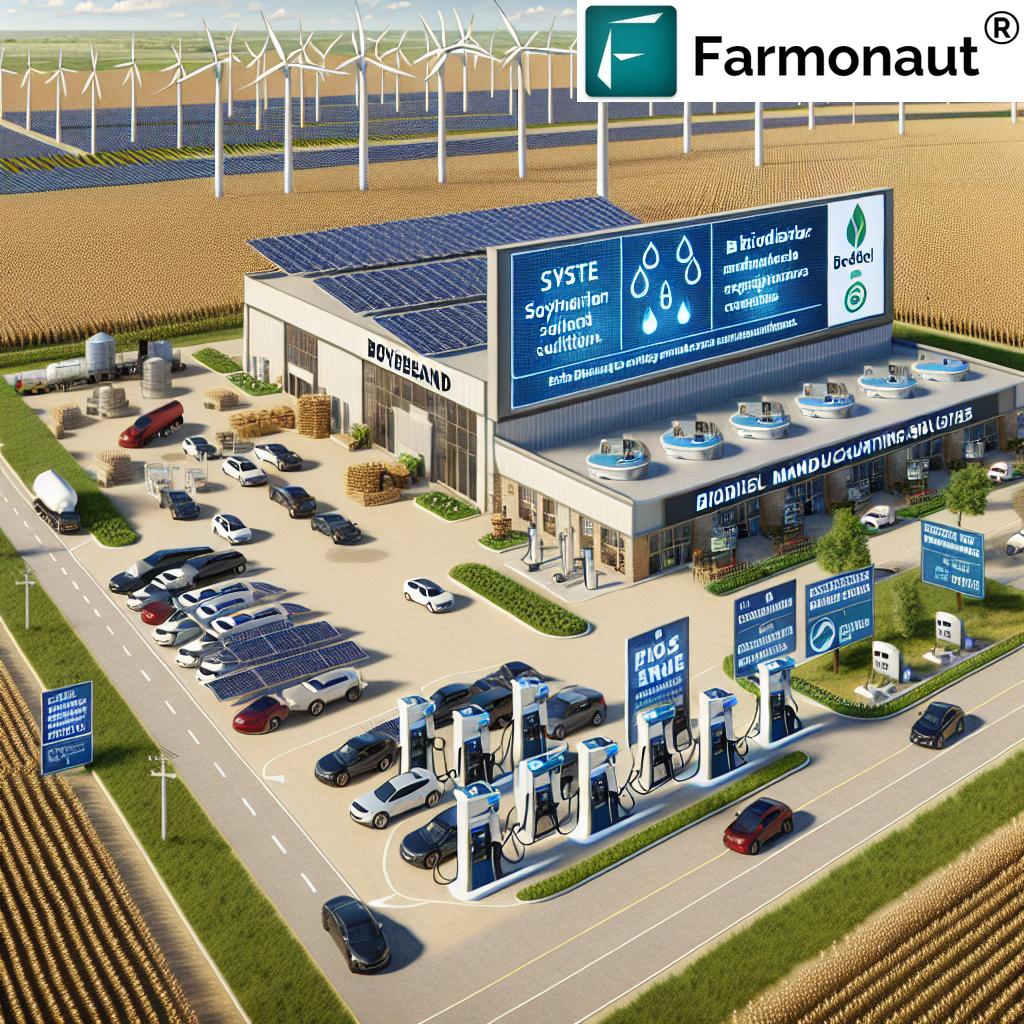
Biodiesel Blends for Fleets: Driving Towards a Cleaner Future
The adoption of biodiesel blends in vehicle fleets is a cornerstone of Nebraska’s sustainable transportation initiative. From school buses to farm equipment, biodiesel is proving its versatility and effectiveness. Here’s what makes biodiesel blends an attractive option for fleet managers:
- Compatibility with existing diesel engines, requiring little to no modification
- Improved lubricity, potentially extending engine life
- Various blend options (B5, B20, B100) to suit different needs and preferences
- Potential for cost savings, especially as production scales up
The transition to biodiesel blends in fleets demonstrates a commitment to sustainability that goes beyond mere rhetoric. It’s a tangible step towards reducing the environmental impact of transportation while supporting local agriculture.
Agricultural Sustainability Initiatives: Beyond Biodiesel
While biodiesel production is a significant step towards sustainability, it’s part of a broader movement in Nebraska’s agricultural sector. Farmers and agribusinesses are implementing a range of practices to enhance sustainability:
- Precision agriculture techniques to optimize resource use
- Cover cropping and crop rotation to improve soil health
- Water conservation methods to reduce irrigation needs
- Integrated pest management to minimize chemical use
These initiatives, coupled with the push for biodiesel, create a comprehensive approach to sustainable agriculture. Tools like Farmonaut’s satellite-based crop monitoring can play a crucial role in implementing these practices effectively, helping farmers make data-driven decisions to improve sustainability and productivity.
Economic Impact of Biodiesel Production
The economic implications of Nebraska’s biodiesel initiative extend far beyond the farm gate. Let’s examine the ripple effects of this growing industry:
- Job creation in biodiesel production facilities
- Increased tax revenue for rural communities
- Stabilization of soybean prices, benefiting farmers
- Development of new skills and expertise in renewable energy
- Potential for export of biodiesel technology and knowledge
By fostering a robust biodiesel industry, Nebraska is not only addressing environmental concerns but also strengthening its economic foundation. This dual benefit makes the initiative particularly attractive to policymakers and community leaders.
Integrating Agriculture with Environmental Responsibility
The biodiesel initiative in Nebraska exemplifies how agriculture can be a solution to environmental challenges rather than a contributor to them. This integration of agricultural practices with environmental stewardship is setting a new standard for responsible farming. Key aspects of this integration include:
- Use of crop residues and byproducts in biodiesel production
- Implementation of conservation tillage to reduce soil erosion
- Adoption of precision agriculture to minimize resource waste
- Education and outreach programs to promote sustainable practices
By embracing these practices, Nebraska’s agricultural sector is demonstrating that productivity and sustainability can go hand in hand. It’s a model that has the potential to inspire similar initiatives across the country and around the world.
The Role of Research and Innovation
Continuous research and innovation are crucial to the success and expansion of biodiesel use in agriculture and transportation. Nebraska’s universities and research institutions are at the forefront of this effort, focusing on:
- Improving biodiesel production efficiency
- Developing new feedstock options for biodiesel
- Studying the long-term effects of biodiesel use on engines
- Exploring ways to further reduce the carbon footprint of biodiesel production
This commitment to research ensures that the biodiesel industry in Nebraska remains competitive and continues to evolve. It also positions the state as a knowledge hub for renewable energy in agriculture, attracting talent and investment.
Challenges and Future Outlook
While the biodiesel initiative in Nebraska has shown tremendous promise, it’s not without its challenges. As we look to the future, several key issues need to be addressed:
- Balancing food production with energy crop demands
- Ensuring consistent quality across different biodiesel blends
- Addressing potential concerns about engine warranties and biodiesel use
- Developing infrastructure for wider biodiesel distribution
Despite these challenges, the outlook for biodiesel in Nebraska remains positive. With ongoing research, supportive policies, and growing public awareness of environmental issues, we expect to see continued growth and innovation in this sector.
Comparison of Biodiesel Impact on Agriculture and Transportation
| Aspect | Traditional Fuel | Biodiesel |
|---|---|---|
| Greenhouse Gas Emissions (estimated % reduction) | Baseline | Up to 86% reduction |
| Economic Impact on Soybean Farmers (estimated % increase in demand) | No direct impact | 15-20% increase |
| Fuel Efficiency (estimated mpg) | Varies by vehicle | Similar to traditional diesel |
| Cost per Gallon (estimated $) | $3.00 – $4.00 | $3.50 – $4.50 |
| Local Economic Benefits (estimated job creation) | Limited | 200-300 new jobs per 100 million gallons produced |
Tools and Programs Driving Change
The success of Nebraska’s biodiesel initiative is supported by a range of tools and programs designed to facilitate adoption and optimize production. These include:
- Government incentives for biodiesel production and use
- Educational programs for farmers on best practices for energy crop cultivation
- Technology platforms for monitoring crop health and yield prediction
- Biodiesel quality testing and certification programs
While Farmonaut is not directly involved in biodiesel production, its satellite-based crop monitoring and AI-driven advisory services can be valuable tools for farmers looking to optimize their soybean yields for biodiesel production. By providing real-time data on crop health and growth patterns, Farmonaut helps farmers make informed decisions that can lead to better yields and more consistent feedstock for biodiesel production.
For more information on how satellite technology can support sustainable agriculture, visit Farmonaut’s API or check out their API Developer Docs.
Conclusion: A Model for Sustainable Future
Nebraska’s innovative partnership between biodiesel production, sustainable agriculture, and clean transportation serves as a beacon of hope in the fight against climate change. By harnessing the power of locally grown soybeans to fuel a cleaner future, the state is not only reducing its carbon footprint but also strengthening its rural economies and positioning itself as a leader in renewable energy.
As we look to the future, it’s clear that initiatives like this will play a crucial role in shaping a more sustainable world. The synergy between agriculture and clean energy demonstrated in Nebraska offers a model that can be adapted and replicated across the globe, paving the way for a greener, more prosperous future for all.
FAQs
- What is biodiesel, and how is it different from regular diesel?
Biodiesel is a renewable fuel made from vegetable oils or animal fats. Unlike regular diesel derived from petroleum, biodiesel is biodegradable and produces fewer emissions when burned. - How does biodiesel production benefit soybean farmers?
Biodiesel production creates additional demand for soybeans, potentially increasing prices and providing farmers with a new market for their crops. - Can biodiesel be used in any diesel engine?
Most modern diesel engines can use biodiesel blends without modification. However, it’s always best to check with the manufacturer for specific recommendations. - What are the environmental benefits of using biodiesel?
Biodiesel use can significantly reduce greenhouse gas emissions, particulate matter, and other harmful pollutants compared to petroleum diesel. - How does the cost of biodiesel compare to regular diesel?
The cost of biodiesel can vary but is generally competitive with regular diesel, especially when considering government incentives and the environmental benefits.











